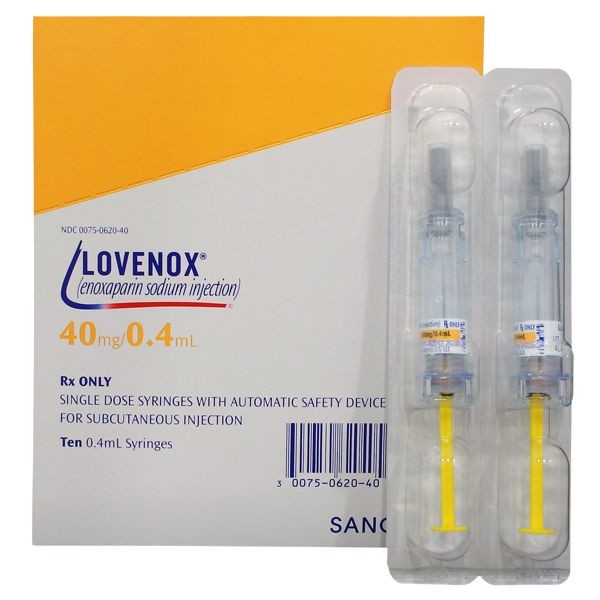
Enoxaparin – Injection, Lovenox
WARNING: Inform your doctor if you are using enoxaparin before undergoing spinal procedures (spinal puncture or spinal/epidural anesthesia). This medication, when used before or after these procedures, has rarely caused major bleeding or blood clots in or around the spine. This may result in paralysis that could be permanent. To minimize these side effects, your doctor may have you stop taking the medication for a certain period of time before and after the procedure. Follow your doctor’s instructions carefully. Discuss the risks and benefits of treatment with your doctor. Seek medical help immediately if you experience tingling, weakness, numbness, pain, or loss of control over your bladder or bowels. The risk is increased if you use a device placed in the spine to deliver pain medications (epidural catheter), or if you use other "blood thinning" or anti-platelet medications such as aspirin, clopidogrel, warfarin, or nonsteroidal anti-inflammatory drugs (NSAIDs) like ibuprofen or naproxen. Inform your doctor if you are taking any of these medications. Do not stop taking any prescribed medication without consulting your doctor.
USES: Enoxaparin is used to prevent and treat harmful blood clots, reducing the risk of stroke or heart attack. It lowers the activity of clotting proteins in the blood, keeping blood flowing smoothly. Enoxaparin is an anticoagulant, also known as a "blood thinner." It is a type of heparin. Conditions that increase the risk of blood clots include certain surgeries (such as knee/hip replacement, abdominal), long periods of immobility, certain types of heart attack, and unstable angina. For some medical conditions, enoxaparin may be used in combination with other "blood thinners."
HOW TO USE: Read the Patient Information Leaflet provided by your pharmacist before starting enoxaparin and each time you get a refill. If you have any questions, ask your doctor or pharmacist. This medication is injected under the skin as directed by your doctor, usually once or twice a day in the abdomen (at least 2 inches from your belly button). Do not inject into a muscle. The dosage and length of treatment are based on your medical condition and response. Use this medication regularly at the same time(s) each day. If using this medication at home, learn the preparation and usage instructions from your healthcare professional and the product package. Before using, visually check the product for particles or discoloration. If present, do not use the liquid. Before each injection, clean the injection site with rubbing alcohol. Change the injection site each time to minimize injury. Minimize bruising by not rubbing the injection site. Learn how to store and discard medical supplies safely. This medication may also be given by injection into a vein by a healthcare professional, as directed by your doctor.
SIDE EFFECTS: Mild irritation, pain, bruising, redness, and swelling at the injection site may occur. Fatigue or fever may also occur. If any of these effects persist or worsen, inform your doctor or pharmacist promptly. Remember that your doctor has prescribed this medication because the benefits outweigh the risks. Many people using this medication do not experience serious side effects. This medication can cause bleeding if it excessively affects your blood clotting proteins. Inform your doctor immediately if you have any serious signs of bleeding, including unusual pain, swelling, discomfort, bleeding, bruising, dark urine, black stools, severe headache, confusion, vision changes, dizziness, fainting, seizures, weakness, or numbness. A serious allergic reaction to this drug is rare, but seek medical help right away if you notice symptoms such as rash, itching/swelling, severe dizziness, or trouble breathing. This is not a complete list of possible side effects. Inform your doctor or pharmacist about any other effects not listed above. In the US, call your doctor for medical advice about side effects. You may also report side effects to the FDA.
PRECAUTIONS: Inform your doctor or pharmacist if you are allergic to enoxaparin, heparin, pork products, or any other inactive ingredients of this medication. This product can cause allergic reactions or other problems. Inform your pharmacist for more details. Before using enoxaparin, inform your doctor or pharmacist about your medical history, especially of serious active bleeding, artificial heart valves, kidney disease, liver disease, bleeding or blood disorders, low platelet counts after previous heparin treatment, stroke, uncontrolled severe high blood pressure, certain eye problems, certain stomach/intestinal problems, recent spinal procedure or puncture, spine problems, or recent eye/brain/spinal cord surgery. Limit alcohol consumption while taking this drug as it may increase the risk of stomach bleeding. Inform your doctor or dentist about all the products you use before having surgery. Anticoagulants like enoxaparin increase the risk of bleeding during activities that can cause injury. Use caution with sharp objects and avoid contact sports. Older adults may be more sensitive to the side effects of this drug, especially bleeding. During pregnancy, use this medication only when clearly needed. Pregnant women with artificial heart valves require close monitoring. It is unknown if this drug passes into breast milk. Consult your doctor before breastfeeding.
QUESTION
DRUG INTERACTIONS: Drug interactions may change how your medications work or increase your risk for serious side effects. Keep a list of all the products you use and share it with your doctor and pharmacist. Do not start, stop, or change the dosage of any medicines without your doctor’s approval. This medication may interact with mifepristone. Enoxaparin is sometimes used with other drugs that have "blood thinning" or anti-platelet effects such as aspirin, clopidogrel, or warfarin. When prescribed together, closer monitoring is required to minimize the risk of bleeding. Check all prescription and nonprescription medicine labels carefully as many medications contain pain relievers/fever reducers (NSAIDs) which can increase the risk of bleeding/anti-platelet effect when used with enoxaparin. However, if your doctor has directed you to take low-dose aspirin for heart attack or stroke prevention, continue taking it unless instructed otherwise. Ask your doctor or pharmacist for more details. In the case of overdose, contact a poison control center or emergency room immediately. Symptoms of overdose may include excessive bleeding and bruising. Laboratory and/or medical tests should be performed periodically to monitor your progress or check for side effects. This is not a complete list of possible drug interactions. Inform your doctor or pharmacist if you notice any other effects not listed above.
MISSED DOSE: If you miss a dose, use it as soon as you remember. If it is near the time of the next dose, skip the missed dose and resume your usual dosing schedule. Do not double the dose to catch up.
STORAGE: Store at room temperature away from light and moisture. Do not store in the bathroom. Keep all medications away from children and pets. Do not store the multiple dose vials for more than 28 days after the first use. Do not dispose of medications in the toilet or sink unless instructed to do so. Properly discard this product when it is expired or no longer needed. Consult your pharmacist or local waste disposal company.
Report Problems to the FDA
You are encouraged to report negative side effects of prescription drugs to the FDA. Visit the FDA MedWatch website or call 1-800-FDA-1088.
Selected from data included with permission and copyrighted by First Databank, Inc. This copyrighted material has been downloaded from a licensed data provider and is not for distribution, except as may be authorized by the applicable terms of use.
CONDITIONS OF USE: The information in this database is intended to supplement the expertise and judgment of healthcare professionals. It is not intended to cover all possible uses, directions, precautions, drug interactions, or adverse effects. A healthcare professional should be consulted before taking any drug, changing any diet, or commencing or discontinuing any course of treatment.


